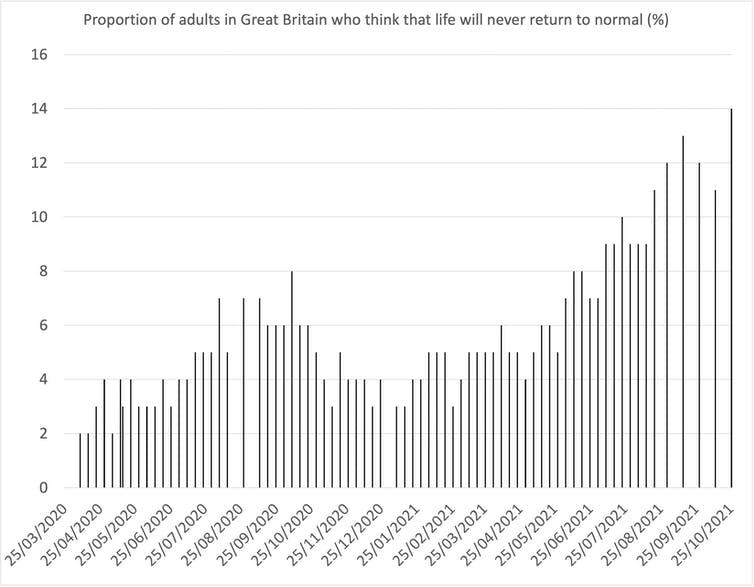
Jacob Lund/Shutterstock
No one can ever know for sure when life will return to normal after a particular event, not least because what’s normal keeps on changing, even in normal times. Nevertheless, it’s a question we can’t help pondering – particularly when new COVID developments, such as the emergence of the omicron variant, keep on shifting the pandemic’s goalposts.
It’s a question that Britain’s Office for National Statistics (ONS) has been pondering too. On March 27 2020, the ONS began asking a large sample of the British population when they thought life would return to normal. This was very shortly after the first wave of the pandemic had begun, with COVID cases and deaths quickly rising. Britain was just days into its first lockdown.
The ONS surveyed people that day and for the next ten days. Only 15% at that time said they were unsure when life would return to normal, and just 11% of the population thought it might take a year or more. The remaining three-quarters thought that life would be back to normal within a year of March 2020.
No one back then thought that life might never return to normal. The majority thought normality would return within six months. We humans are (usually) an optimistic bunch.

Author provided
Over the subsequent 20 months, the ONS carried out a further 76 surveys, usually one every week. They asked the same question in each survey about when people in Great Britain thought that life might return to normal.
By the time of the 77th survey, which ended on November 14 2021, the proportion of people who said they were unsure when life would return to normal had doubled to 31%. The proportion who thought it would be at least a year before there was a return to normality had tripled to 35%. A further 14% thought that life would never return to normal ever again. And the proportion who thought that life would return to normal within a year had plunged from three-quarters to just a fifth. Our faith in a return to normality has collapsed.
So far the great rise in uncertainty has come in two waves. The first uncertainty wave peaked in August 2020, when COVID cases and deaths were almost zero. After that our levels of uncertainty fell, linearly, to mid-January 2021. At this point, more of us thought we knew what might happen next than at any other point across the 77 surveys. However, after that we slowly but surely became increasingly more unsure as to what the future might hold. Wave two of being unsure may not yet have peaked.

Author provided
We define our own normality
At some point, a way of living that most of us describe as normal will arrive – it always does. But it will be a new normal. The pandemic in our mind has very different twists and turns to the pandemic that is measured by cases, hospitalisations and deaths. Because it exists in our heads as well as in the physical world, the pandemic is partly about us – how we each individually feel. The return of normality therefore won’t be marked by life returning to what it was before 2020, but by us feeling that things are normal again.
In the most recent of the 77 surveys, three in five adults said they had “avoided physical contact with others outside their home in the past seven days”. Two in five reported that “only their immediate family had been in their home in the past seven days”. Neither of these measures had changed from the previous survey. If, for instance, this pattern of behaviour continues similarly unchanged, it’s possible that in time, this will come feel like normality.
On the other hand, the question the ONS has now asked 77 different groups of people (all chosen at random) is not specifically about the pandemic – it is about “life” in general. It’s very probable that at first most people replied to the question with the pandemic foremost in their mind. However, as time has passed, other aspects of life will have shifted too. Things are always changing. People’s answers may have come to reflect this, and regardless of the pandemic, may be defining normality as a past that can’t be recovered.

Author provided
We’re now very close to a point where the majority of adults believe that it will take at least a year (into 2023) for normality to resume – or that it will never return. And of those who don’t think this, the majority of them are increasingly unsure about what will happen.
At some point, the majority of us will become used to how things have changed, and we will begin to see our changed world as normal. For those of us who have lived through the pandemic, it will be in our minds forever. But how we look back and remember the pandemic, and the times before March 2020, will keep on changing.
![]()
Danny Dorling does not work for, consult, own shares in or receive funding from any company or organisation that would benefit from this article, and has disclosed no relevant affiliations beyond their academic appointment.























